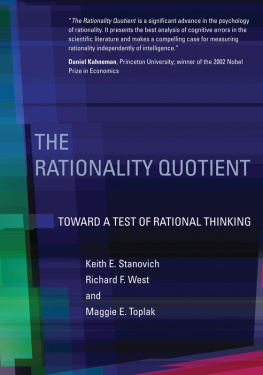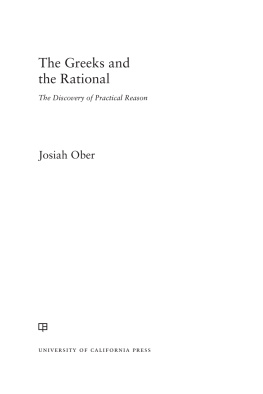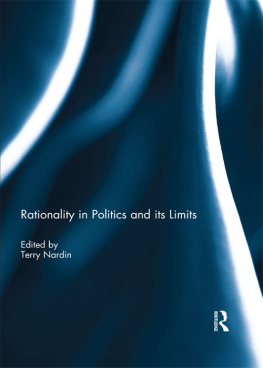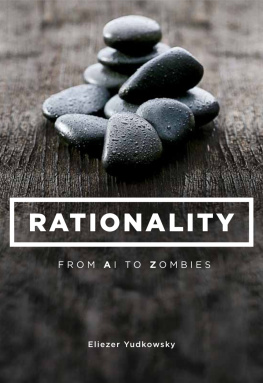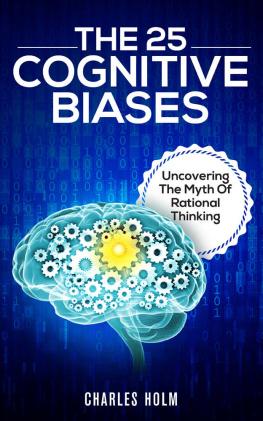The Rationality Quotient
Toward a Test of Rational Thinking
Keith E. Stanovich, Richard F. West, and Maggie E. Toplak
The MIT Press
Cambridge, Massachusetts
London, England
2016 Massachusetts Institute of Technology
Appendix 2015 Keith E. Stanovich and Richard F. West
All rights reserved. No part of this book may be reproduced in any form by any electronic or mechanical means (including photocopying, recording, or information storage and retrieval) without permission in writing from the publisher.
This book was set in Stone Serif and Stone Sans by Toppan Best-set Premedia Limited. Printed and bound in the United States of America.
Library of Congress Cataloging-in-Publication Data
Names: Stanovich, Keith E., 1950- author. | Toplak, Maggie E., author.
Title: The rationality quotient : toward a test of rational thinking / Keith Stanovich, Richard West, and Maggie E. Toplak.
Description: Cambridge, MA : MIT Press, 2016. | Includes bibliographical references and index.
Identifiers: LCCN 2016002051 | ISBN 9780262034845 (hardcover : alk. paper)
eISBN 9780262336802
Subjects: LCSH: Reasoning--Ability testing. | Reasoning (Psychology) | Intelligence levels. | Cognition.
Classification: LCC BF442 .S728 2016 | DDC 153.4/30285--dc23 LC record available at https://lccn.loc.gov/2016002051
ePub Version 1.0
For Paula, since the last book, the best times of our lives, my love
For Josh, my son and friend
For my parents Joseph and Veronika, for instilling in me the pursuit of knowledge and rationality
Preface
We get surprised when someone we consider to be smart acts foolishly. When someone we consider to be not so smart acts foolishly, we tend not to be so surprised. But why should we be so surprised in the first case? It seems that smart people do foolish things all the time. Wasnt the financial crisis of 2008 just littered with smart people doing dumb thingsfrom the buyers and sellers of the toxic mortgage securities to the homebuyers who seemed to think their house price would double every three years?
So if it is not rare for smart people to act foolishly, then why the surprise? In fact, the confusion here derives from being caught up in the inconsistencies and incoherence of folk language. The folk terms being used in this discussion are in dire need of some unpacking. Consider the title of an edited book to which we contributed a chapter: Why Smart People Can Be So Stupid (Sternberg, 2002). A typical dictionary definition of the adjectival form of the word smart is characterized by sharp quick thought; bright or having or showing quick intelligence or ready mental capacity. Thus, being smart seems a lot like being intelligent, according to the dictionary. Dictionaries also tell us that a stupid person is slow to learn or understand; lacking or marked by lack of intelligence. Thus, if a smart person is intelligent and stupid means a lack of intelligence, then the smart person being stupid phrase seems to make no sense.
However, a secondary definition of the word stupid is tending to make poor decisions or careless mistakesa phrase that attenuates the sense of contradiction. A similar thing happens if we analyze the word dumb to see if the phrase smart but acting dumb makes sense. The primary definition describes dumb as the antonym of intelligent, again leading to a contradiction. But in phrases referring to decisions or actions such as What a dumb thing to do! we see a secondary definition, like that of stupid: tending to make poor decisions or careless mistakes. These phrases pick out a particular meaning of stupid or dumbalbeit not the primary one.
It is likewise with the word foolish. A foolish person is a person lacking good sense or judgment; showing a lack of sense; unwise; without judgment or discretion. This picks out the aspect of stupid and dumb that we wish to focus on herethe aspect that refers not to intelligence (general mental brightness) but instead to the tendency to make judicious decisions (or, rather, injudicious ones).
However we phrase itsmart but acting dumb, smart but acting foolish, or whateverwe have finally specified the phenomenon: intelligent people taking injudicious actions or holding unjustified beliefs. Folk psychology is picking out two different traits: mental brightness (intelligence) and making injudicious decisions (rational thinking). If we were clear about the fact that the two traits are different, the sense of paradox or surprise at the smart but acting foolish phenomenon would vanish. What perpetuates the surprise is that we tend to think of the two traits as one, or at least that they should be strongly associated.
The confusion is fostered because psychology has a measurement device (the intelligence test) for the first but not the second. Psychology has a long and storied history (over one hundred years old) of measuring the intelligence trait. There has been psychological work on rational thinking, but this research started much later and was not focused on individual differences. Our research group has conducted one of the longest extant investigations of individual differences in rational thinking processes. In the present book, we will attempt to synthesize this work by presenting the first prototype of a rational thinking test (the Comprehensive Assessment of Rational Thinking).
A novice psychology student might be a bit confused at this pointthinking that somewhere along the line he or she has heard definitions of intelligence that included rationality. Such a student would be right. Many theoretical definitions of intelligence incorporate the rationality concept by alluding to judgment and decision making in the definition. Other definitions emphasize behavioral adaptiveness and thus also fold rationality into intelligence. The problem here is that none of these components of rationalityadaptive responding, good judgment, and decision makingare assessed by actual tests of intelligence.
Publishers and proponents of IQ tests have encouraged the view that you get everything you need in mental assessment from such tests. They have also encouraged the view that even when this is not the case, the correlation with intelligence will be so high that it will not even be worth worrying about measuring anything else in the cognitive domain. But in fact, by giving an intelligence test, one does not automatically get a measure of rational thinking. To get the latter, we need to actually construct a test of rational thinking. That is what this book is about. Because we now have conceptually grounded theories of rationality and because we have a prodigious number of tasks that measure the components of rational thinking (Baron, 2008; Kahneman, 2011; Stanovich, 2011), it is now possible to see what would happen if we began from the ground up to construct a rationality test around that concept only.
Synthesizing theoretical work and empirical research that began over two decades ago (Stanovich, 1993; Stanovich & West, 1997, 1998c), we present a prototype of such a test in this volume. We have proceeded by grounding our project in the empirical literature on the nature of human judgment and decision making (Kahneman, 2011; Manktelow, 2012) and theoretical discussions of rationality in cognitive science (Evans, 2014; Stanovich, 2011, 2012). For years, we have been examining how one would go about constructing the best test of rational thinking if the focus were solely on that construct. Thus, we have not structured our investigations around what was previously known about intelligence. This point deserves elaboration, because a common misinterpretation of our work is that we are trying to improve intelligence tests. Not only is this not our goal, but it is a serious misunderstanding of what we are trying to achieve.

